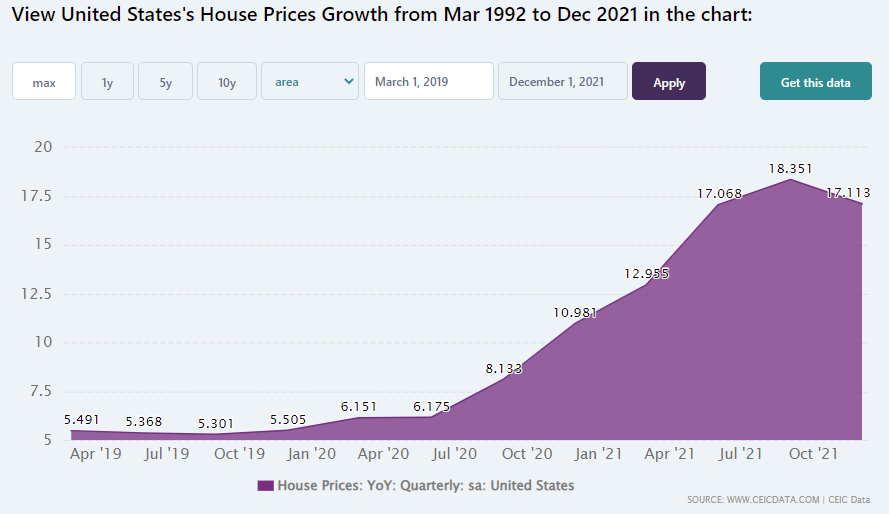The real estate market as we know it is changing. The number of cash sales has increased by 16% in 2021 and is now 23% of all real estate deals. Following the Covid-19 epidemic, supply chain issues arose across the globe causing massive delays in many aspects of life including house construction. In addition to that, the available inventory of residential homes was already somewhat sparse.
To make matters more complicated, there are fears of the sharpest inflation seen in decades.
As a tool to fight inflation, the U.S. Federal Reserve has announced that it will raise rates aggressively. This will likely affect the housing market in the United States in various ways. So far we’ve seen average housing prices increase by over 18% when comparing December 2020 to December 2021. The increase is likely even higher now in May.

Interest Rates and the Federal Reserve
Central banks, or in the case of the United States, the Federal Reserve tends to change interest rates periodically to help balance the economy. The Federal Reserve raises rates when the economy is perceived as too strong and when growing too fast. Other times the Federal Reserve raises interest rates as a weapon to combat inflation.
Essentially the Federal Reserve changes interest rates periodically to make sure growth doesn’t occur too fast or too slow. They prefer steady growth over time.
When the economy is growing at too fast a pace, such as in the late 1990s, the Fed raised rates. This is done to make sure asset bubbles and inflation doesn’t go wild and end up threatening future economic growth.
During times when inflation is anticipated, the Federal Reserve raises interest rates to combat inflation. By doing so, they are actively discouraging lending, and business and consumer spending, and investing. This is meant to keep the U.S. Dollar strong as opposed to other assets and commodities.
When the economy is facing a recession, the Federal Reserve tends to lower interest rates. This is done to restimulate the U.S. economy by encouraging lending, spending, and investment. With lower interest rates, borrowers will be required to pay back less interest and borrowing becomes more attractive.
Interest rates tend to influence a wide range of financial products and services beyond the mortgage markets.
Interest Rates & Finance
Many different financial products are affected by Federal interest rates. One of the most notable is the impact interest rates have on consumer savings accounts and bank deposits. The higher the interest rates, the more yield consumers receive from their savings. In recent years, when interest rates were close to zero, savings accounts provided very low returns. As such, many preferred investing their funds and savings into various investments including the stock market.
Raising interest rates also has a major impact on stock markets. As raising the rates makes borrowing more expensive, business costs for both private and public companies tend to rise. This tends to translate into fewer profits for companies which in turn stuns their growth to an extent. In addition to that, retail investors would be less likely to borrow funds to purchase stocks, leading to further decline.
One of the largest sectors affected by interest rates, besides the mortgage and housing market is bonds. The market price of existing bonds tends to decline quickly when the Federal Reserve increases interest rates. This is because bonds in the near future will have higher interest payments, hence being more attractive for investors than existing ones.
Interest Rates & Housing in the USA
The housing market and mortgage industry in the United States are deeply affected by the Fed and rates. The effect of interest rates on the housing market may be even greater than that of the bond market.
Essentially the higher the interest rates are the number of mortgage applicants and home buyers in general experiences a decrease. This in turn will cause stagnation in the housing market which should eventually lead to a decrease in housing prices. Should rates be very high, this could lead to a temporary crash in housing prices.
There are many homeowners with a variable rate mortgage on their property which is dependent on fluctuating interest rates. Some may choose to refinance their mortgage to a fixed-rate mortgage at high rates to deal with economic uncertainty.
Consumers will also be less likely to refinance a mortgage as the rates may make it less attractive.
Rates & the Near Future
According to Barron’s, the Federal Reserve is planning on increasing interest rates 11 times by 2023. By then the projected interest rate will be 2.75%, a 2.50% increase in what is seen as a short time frame. This is done to strike back at inflation rates which are anticipated to reach 8.5% in 2022.
The Fed plans on doing so with a gradual 0.25% increases many times over. This will likely place a damper on stock markets temporarily as well as bonds.
The housing market may react a bit differently. While increasing the rates can lead to a decline in housing prices, there are still a few other factors in play. The inflation rates are causing many consumers to seek out “safe haven” investments. One of the main “safe haven” investments is real estate and property. This along with the current low inventory in the U.S. housing market and high construction costs may cause different results than anticipated. While there may be a slight decline in housing prices, there is also the chance that they will continue to increase. Should rates increase and if demand remains due to inflation concerns, we could potentially see even higher prices in the housing market.
It seems that monthly rental costs may continue to rise. This makes one thing almost certain. Investors that purchased property a year or two ago have likely netted a nice profit.